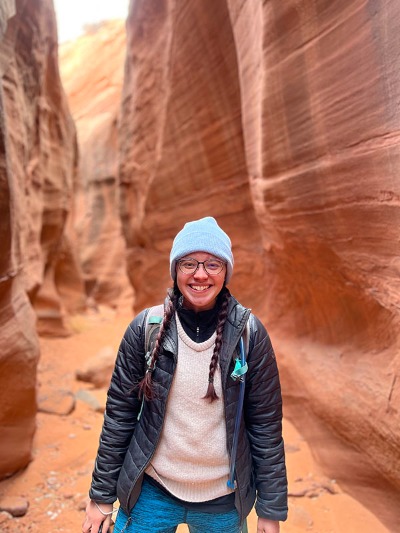Meet the Team
Directors

Water heritage is our connection to the past through one of our most basic needs.

Anna Cohen is an archaeologist with interests in human-landscape relationships. Questions that guide her research are: How do humans modify landscapes, how are humans shaped by landscapes, and how are these human-landscape relationships visible in the archaeological record? Anna focuses on precontact communities in Latin America and Utah. She has a PhD and MA in Anthropology from the University of Washington, an MA from the University of Chicago, and a BA from McGill University.
Water heritage is a source of inspiration for a sustainable future.
Research Assistants

Kelly Jimenez worked on the WHAP geospatial database. She is interested in how water heritage contributes to community hierarchies and how water rights have been transferred over time. Kelly is a USU graduate student working towards a Master of Science in Archaeology and Cultural Resource Management. Her thesis project uses spatial analysis to highlight issues of race, class, and identity at a Chinese railroad workers’ camp in Northern Utah. She has a BA in Anthropology from the University of Central Florida, and she has worked on field projects throughout Utah and the Southeastern U.S.
Water heritage means learning more about how communities incorporate water resources into their social structure, and how access to water influences community function.

Mariah Walzer researched the deep human history of water management systems and technologies in the Great Basin. She is pursuing a Master of Science degree in Archaeology and Cultural Resource Management at USU. She received her BA in Archaeology and Creative Writing from Hamilton College in 2017 and has since worked for the National Park Service and U.S. Forest Service in Colorado, California, and Oregon. Her thesis seeks to identify indigenous fire management practices in the sedimentary charcoal record at a Fremont village in Dinosaur National Monument.
Water heritage tells the story of the relationships between humans and water throughout time.

Victoria Ramirez researched the relationship between water management and climatic changes in Utah over time. She is pursuing a Master of Science in Archaeology and Cultural Resource Management at USU. She has a BA in Anthropology from California State University- Fullerton, and has worked for different environmental companies and National Park Units throughout California, Nevada, and Arizona. Her thesis focuses on the distribution of Fremont rock art motifs in the Dinosaur National Monument/Vernal area of Utah.
Water heritage is learning about the connection that people have with their environment over time.

Megan Jenson was an Anthropology major at USU and conducts interviews with the WHAP. She is interested in ethnography and the ways in which landscapes impact communities. Born and raised in Box Elder County, Megan spent her childhood around farmers and irrigation systems. She has first-hand experience with water features and the role they play in the daily lives of community members.
Water heritage is about the connections between communities and local land features, and the ways that these relationships change over time.

Moni Butte was an Anthropology major at USU and conducts interviews with the WHAP. She is passionate about studying the effects of religion and culture on human and environmental health. Part of this passion was born in her childhood after watching the movie Ferngully and deciding that she would forever be a "tree hugger" because the movie illustrated how humans can have a detrimental effect on the environment.
Water heritage is a universal topic because it is important to understand how our behaviors can affect water accessibility for others.

Ben Johnson focuses on archival research that relates to Utah waterways, including oral histories and community accounts. He is from Box Elder County and grew up farming and moving irrigation pipe on the Bear River. Ben was an Anthropology (Archaeology) undergraduate student with an Art minor and Museum Certificate. He has also held positions as a Museum Assistant, Teaching Assistant, and Peer Advisor in Anthropology.
Studying water heritage uses multiple research techniques to collect data that can benefit local communities, such as those within the Bear River watershed.

